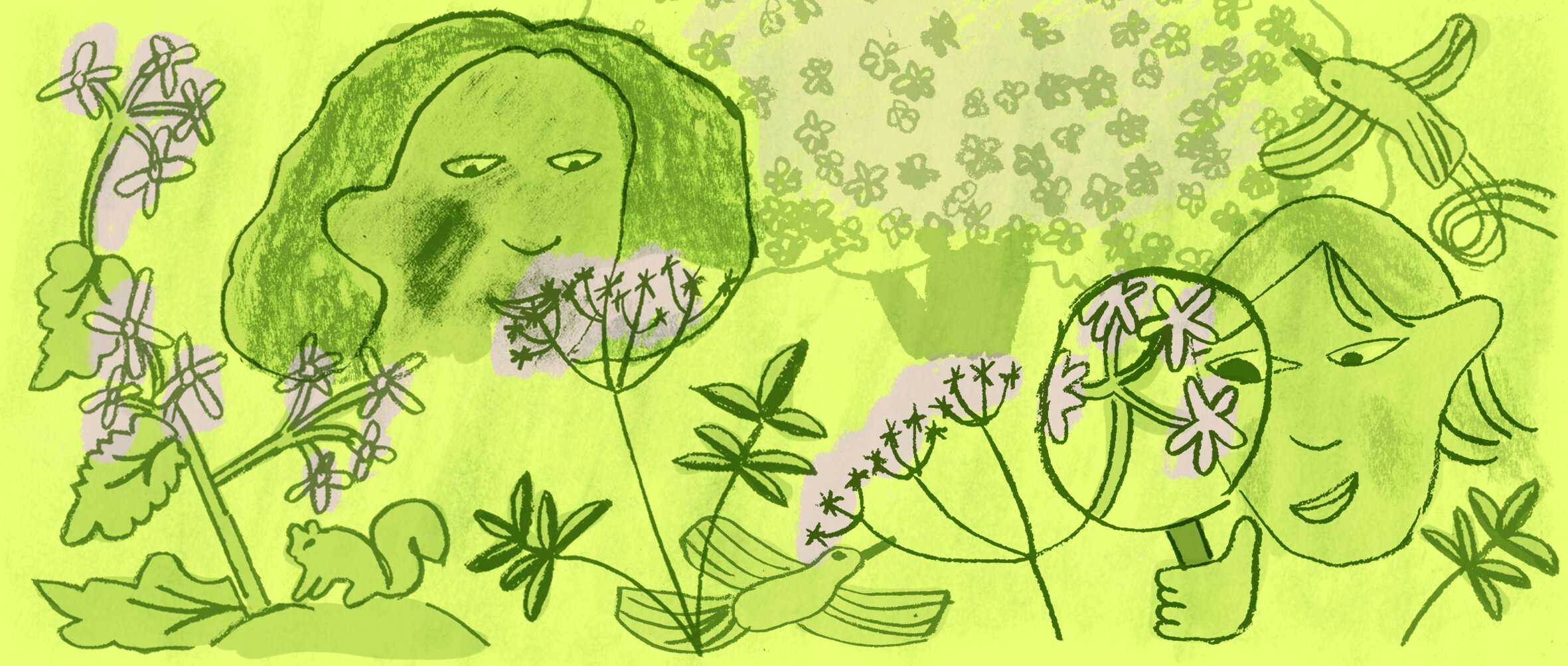Can Foraging Help us Feel Connected?
Foraging and staying connected to nature can help us improve both our mental and physical wellbeing. Rhys Delany joined one of the many foraging walks offered around the Southside to find out more.
By Rhys Delany | Illustrations by Sasha Delmage
Living in a city as busy as Glasgow can often make us feel disconnected to nature which can have a negative impact on our mood. Yet the Mental Health Foundation has found how our personal ‘connectedness’ with nature can lead to a stronger sense of personal happiness.
In recent years, the NHS has also seen the benefits of being outdoors for our mental health. Social prescribing is the idea of making people more active in their lives without relying on antidepressant medication. These schemes see GPs prescribing outdoor activities such as group walks and gardening as a way to improve our social lives and physical fitness - and consequently our health.
But this goes further than just fresh air and exercise; just as important to our reconnection is listening to birdsong, touching the bark of trees, smelling flowers, and foraging, an activity that has grown in popularity in the last few years.
After the Covid pandemic, those living in homes without a garden found local urban green spaces like parks, public gardens and riversides to be invaluable. The act of seeking food in the wild really taps into our core instincts. Looking, listening, smelling and tasting the local plant life can benefit us in multiple ways. With various people running foraging walks around govanhill, I decided to give one a try.
Jemima Hall is an artist and ancestral skills teacher. I joined her for a walk where she spoke of the importance of spring as a time that both our bodies and nature reawaken from winter. Trees and flowers begin to blossom, as do vital greens that our ancestors would have snacked upon.
She showed us where to find garlic mustard and ground elder, plants that grow in abundance in Queens Park and are easily identifiable by their spines and veins. She explained how many of these plants and trees can have medicinal qualities such as the anxiety-relieving hawthorn and the vitamin rand mineral rich spring nettle.
Jemima Hall
Jemima relayed the importance of birch leaves and bark, how when brewed into a tea can clear sinus congestion, reduce inflammation, and alleviate a headache. Likewise, the sap which is filled with magnesium, potassium and calcium can cleanse our liver, promote healthier skin and improve our wellbeing.
“I think when you’re outside and surrounded by green and the sound of birds it connects something primal within us which calms our mind,” Jemima said. “ There’s so many studies about that and about that and taking off your shoes and putting your feet in the soil - the good that it does to be earthing and grounding yourself, at an atomic level.”
Jemima has seen connections made during her time leading local walks:
“It’s a mix of people, different ages, men and women, and sometimes kids join, sometimes dogs join and to see people connect and chat in the moments between, it’;s wonderful.”
Catriona Gibson, a medical herbalist, also runs foraging walks around the Southside. Having worked with people suffering from mental illness and other long-term issues such as homelessness and addiction, we spoke about what she sees as the mental health benefits of being outdoors.
“Marking the seasons and being aware of the seasons, I think that helps to ground you quite a lot. In a world where it can be quite difficult to feel that yourself, I think that’s quite a positive element in terms of mental health.”
Health Scotland reports that areas with high rates of poverty, poor housing, family conflict, unemployment, childhood adversity and chronic health problems are where mental health issues are most likely to emerge. Having Queens Park on the doorstep of Govanhill means that foraging is an activity within everyone’s reach.
However, it’s important to only ever do so with the knowledge and certainty that. Catriona’s walks focus on identifying rather than picking plants. This is due to the mistakes a beginner can make. She warns for example, of the poisonous hemlock, which is common in the UK and from the same family of plants as carrots, celery and parsley, but can be deadly.
I asked Catriona if we owe nature a little more respecting this regard: “I think so, and I think people can also have reactions to things and sometimes someone is just really sensitive and eats something and it’s not right for them. Foraging can should be done with intention and sustainability. You need a really good ID book. And it’s like any good habits that you get into, you want to do it as little and as often as possible and learn things slowly.”


